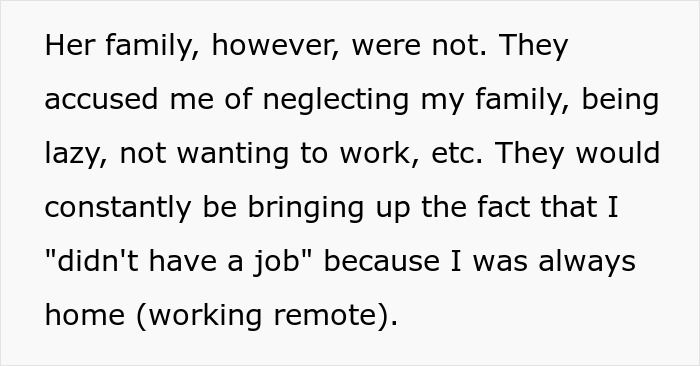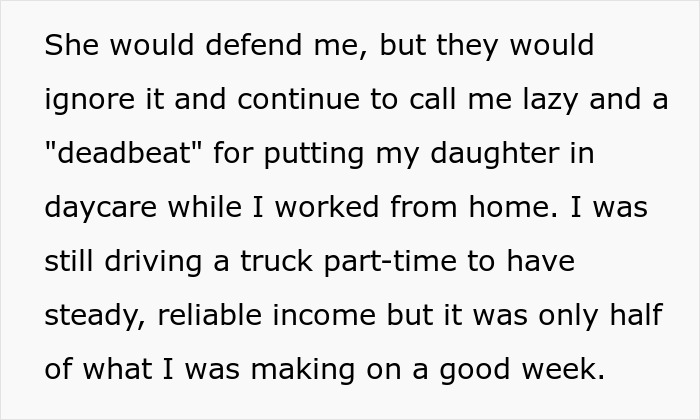
In-Laws Spend Years Talking Down To Guy, Act Surprised When He Won’t Help Financially
Marilyn Monroe once said, “If you can’t handle me at my worst, then you don’t deserve me at my best.” Many choose to live by this quote, especially those surrounded by unsupportive people.
The author of today’s story is one of them. His in-laws judged him for not having ample financial resources to support his spouse and daughter. After his new business boomed, his wife’s family expected him to shoulder their luxurious expenses.
The man didn’t feel good about the situation and stopped giving monetary support to his in-laws. However, he wonders if he is being too harsh for doing so.
Some people deal with judgmental, unsupportive in-laws
Image credits: Getty Images / Unsplash (not the actual photo)
A man endured verbal attacks from his wife’s family because he didn’t have ample financial resources
Image credits: Blake Cheek / Unsplash (not the actual photo)
When his new business venture boomed, his in-laws expected him to pay for their luxurious expenses
Image credits: Getty Images / Unsplash (not the actual photo)
Image credits: Ave Calvar / Unsplash (not the actual photo)
However, he wants to cut off all financial support
Image credits: UXEGbm7tMy
Judgmental behavior stems from a scarcity mindset
Image credits: Liza Summer / Pexels (not the actual photo)
Unfortunately, the author endured such behavior from his in-laws, especially at a difficult time. According to Washington D.C.-based psychologist Dr. Dana Harron, it’s usually common among people who have been deprived of unconditional love.
As a result, they develop a scarcity mindset, feeling that everything, including beauty, achievement, and success, is finite.
“When someone else has something, it seems like something that they are deprived of,” Dr. Harron explained. “The quantities are limited, and there is no such thing as baking a bigger pie.”
Casting judgment may also result from an internal disagreement with someone’s way of life. As University of Edinburgh psychology lecturer Adam Moore tells Vox, “The role that automatic judgment plays is social signaling, social norm reinforcing.”
In this story, the explanations above make sense as the author says his wife’s family came from a “fairly poor environment.” While he didn’t delve into specifics, it’s possible that his in-laws may not have the same approach to business and earning money, causing them to belittle his efforts.
However, this doesn’t change the fact that such actions disrupt family dynamics. Professor and communications coach Preston Ni, MSBA, says it’s mainly about setting boundaries when dealing with people who challenge or criticize your life choices.
“Not every difficult person is worth grappling with. Your time is important, and your peace of mind a priority,” Ni stated, emphasizing that boundary setting must be done diplomatically.
That author endured insults and abusive treatment from his in-laws, who do not seem to care about him. Keeping distance may be his best option, including refusing financial support if it gives him internal peace.
The author provided more information in the comments
Most readers sided with him, with some congratulating him for his success
But there were a few who thought he should “share his wealth”
Poll Question
Thanks! Check out the results:
Fully support this guy's attitude but still cant get my head round his concept of "My Money" vs. "Her Money". It's not clear if the wife is earning, although it's implied, but now that he's so successful does he really only let her spend her own earnings and keep all of his for himself?
That's what I was thinking. So she worked her butt off, cut corners and was the main breadwinner so that he could try out his business venture but now that he's succeeded it's HIS money
Load More Replies...As usual the yta people did NOT read the article!! A woman CAN have HER OWN MONEY!! Her money is what SHE makes and HIS money is what HE makes. Not hard to figure out.
If they asked be to pay for dinner, I would look them in the eye and say "I'm a deadbeat - how can you expect me to pay for anything"
Fully support this guy's attitude but still cant get my head round his concept of "My Money" vs. "Her Money". It's not clear if the wife is earning, although it's implied, but now that he's so successful does he really only let her spend her own earnings and keep all of his for himself?
That's what I was thinking. So she worked her butt off, cut corners and was the main breadwinner so that he could try out his business venture but now that he's succeeded it's HIS money
Load More Replies...As usual the yta people did NOT read the article!! A woman CAN have HER OWN MONEY!! Her money is what SHE makes and HIS money is what HE makes. Not hard to figure out.
If they asked be to pay for dinner, I would look them in the eye and say "I'm a deadbeat - how can you expect me to pay for anything"

 Dark Mode
Dark Mode 

 No fees, cancel anytime
No fees, cancel anytime 































































































24
19